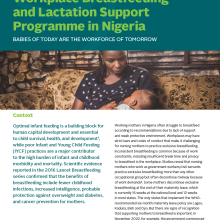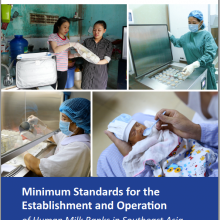Journal article
Feb 07 2023

The political economy of infant and young child feeding: confronting corporate power, overcoming structural barriers, and accelerating progress (Baker P, Smith JP, et al, The Lancet. 2023)
Despite increasing evidence about the value and importance of breastfeeding, less than half of the world's infants and young children (aged 0–36 months) are breastfed as recommended. This Series paper examines the social, political, and economic reasons for this problem.
Brief
Dec 15 2022

Workplace Breastfeeding and Lactation Support Program in Nigeria
This toolkit was developed based on lessons learned from a pilot workplace breastfeeding/lactation support program with the Nigeria Employers’ Consultative Association (NECA) Network of Entrepreneurial Women (NNEW) and other
Journal article
Sep 01 2022

Implementation and Effectiveness of Policies Adopted to Enable Breastfeeding in the Philippines Are Limited by Structural and Individual Barriers
The Philippines has adopted policies to protect, promote, and support breastfeeding on par with global standards, yet the impact of these policies is not well understood.
Brief
Sep 09 2021

Minimum Standards for the Establishment and Operation of Human Milk Banks in Southeast Asia
Human milk bank services are an essential component of a breastfeeding-friendly health system. Such services give small and sick babies access to the multiple benefits of breastmilk by providing safe donor human milk.
Journal article
Dec 08 2020

The use of human donor milk (Tran, H.T., 2020. BMJ)
Infant feeding guidelines emphasize that breast milk is the best nutrition for infants.
Journal article
Feb 11 2020

Scaling Up Breastfeeding in Myanmar through the Becoming Breastfeeding Friendly Initiative.
The Becoming Breastfeeding Friendly (BBF) initiative provides a guide for countries to assess the enabling environment for breastfeeding policies, programs and scale-up.

